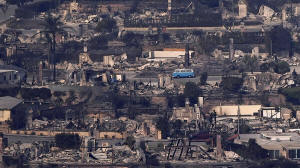How the wildfires in the Los Angeles area could affect California's home
insurance market
 Send a link to a friend
Send a link to a friend
 [January 10, 2025] By
TRÂN NGUYỄN [January 10, 2025] By
TRÂN NGUYỄN
SACRAMENTO, Calif. (AP) — The wildfires that destroyed homes in multiple
sections of the Los Angeles area will test California’s efforts to
stabilize the state’s insurance marketplace after many insurers stopped
issuing residential policies due to the high fire risk.
The wind-driven blazes that started Tuesday roared through neighborhoods
from the Pacific Coast inland to Pasadena and the Hollywood Hills. The
vast property damage in a disaster-prone state with high real estate
prices and an uncertain insurance landscape could make coverage more
expensive and even harder to find.
One area likely to feel the impact — and encounter challenges rebuilding
— is Pacific Palisades, an affluent community sandwiched between the
Pacific Ocean and the Santa Monica Mountains. This week's wildfire there
has been named as the most destructive in the modern history of the city
of Los Angeles. Flames destroyed businesses, a library, cultural
landmarks as well as houses.
State authorities previously listed the Palisades as one of the five
Southern California areas with the highest concentration of potential
wildfire risks. The community also is among the areas most impacted by
an unavailability of insurance coverage.
When State Farm decided to discontinue coverage for 72,000 houses and
apartments in California last year, it dropped nearly 70% of its market
share in Pacific Palisades, according to the San Francisco Chronicle.

Here's what to know about California's residential insurance crisis and
how the ongoing wildfires may further disrupt the policy market:
Why does California have a home insurance crisis?
California has seen other major insurers pull back on property coverage
in the nation's most populous state as climate change makes wildfires,
floods and windstorms more common and damaging.
Of the top 20 most destructive wildfires in state history, at least 15
occurred since 2015. The data did not include the Los Angeles area fires
this week.
In 2023, seven of the 12 largest insurance companies by market share in
California either paused or restricted issuing new policies in the
state.
That has made it extremely difficult for homeowners in high-risk areas
to obtain or afford insurance.
What happens to residents who can't get regular home insurance?
California homeowners in wildfire-prone areas either go without
insurance or join the Fair Access to Insurance Requirements (FAIR) Plan,
which the state created as a last resort for homeowners who couldn't
find insurance.
Many people purchase the FAIR Plan to satisfy their mortgage
requirements, but the policies only cover basic property damage and
carry a $3 million limit. Given the value of the real estate involved
and the limited coverage, FAIR Plan policyholders who lost homes in this
week's fires may struggle to be made whole.
The policies can be very bare bones, with some options only covering the
actual cash value of what was lost rather than the true replacement
costs, said Amy Bach, executive director of the consumer advocacy group
United Policyholders.
The plan was designed to be a temporary solution, but more Californians
are relying on it than ever. The number of FAIR residential policies
issued in the state more than doubled between 2020 and 2024, reaching
nearly 452,000 policies.
Could claims from the LA fires push the FAIR Plan into insolvency?
Policies sold to FAIR customers primarily fund the plan, but insurers
would have to pay into the fund if it becomes insolvent or to keep it
from insolvency. Under a new state rule, insurers could ask the state to
approve rate increases to recoup the money spent on bailing out the FAIR
Plan.
FAIR Plan spokesperson Hilary McLean said it could take years to tally
total losses from the Los Angeles area fires. While it's too soon for
reliable loss estimates, the FAIR Plan anticipates being able to pay out
claims from the wildfires, McLean said.
[to top of second column] |

A VW van sits among burned out homes, Thursday, Jan. 9, 2025, in
Malibu, Calif. (AP Photo/Mark J. Terrill)
 “We are aware of misinformation
being posted online regarding the FAIR Plan’s ability to pay
claims," she said in a statement. "The FAIR Plan has payment
mechanisms in place, including reinsurance, to ensure all covered
claims are paid.”
The plan has roughly $700 million in cash on hand and about $2.5
billion in reinsurance, according to testimony given to California
lawmakers last year.
The mean home value in Pacific Palisades and its surrounding areas
hovers around $3.3 million, according to real estate company Redfin.
Owners of the most valuable properties probably are not relying on
the FAIR Plan because of the coverage limit, said Jamie Court,
president of nonprofit organization Consumer Watchdog.
The claims from the fires will be significant, Court said, “but this
is not enough to put the industry out of business or the FAIR Plan
out of business.”
On Thursday state lawmakers introduced a bill that would give the
FAIR Plan the ability to seek “catastrophe bonds” if it faces
liquidity challenges.
How has California responded to the insurance crisis?
In a new tactic, state officials undertook a yearlong overhaul to
give insurers more latitude to raise premiums in exchange for more
issuing policies in high-risk areas.
A new regulation that took effect this month allows insurers to
consider climate change when setting their prices. California
previously did not let insurance companies factor in current or
future risks when deciding how much to charge. Many companies cited
the restriction as their reason for retreating from the state's
insurance market.
The state is also in the final stage of approving a rule that would
let insurance companies pass on the costs of reinsurance to
California consumers. Insurance companies typically buy reinsurance
— or insurance for themselves — in case they face huge payouts from
natural disasters or catastrophic losses. California is the only
state that doesn’t already allow the cost of reinsurance to be borne
by policyholders.
The new rules have prompted Farmers, the second-largest insurer in
the state, to resume writing new policies for homeowners last month.
Consumer Watchdog's Court says the rules also could make it easier
for insurers to raise rates with little oversight.

How will the fires impact California's insurance market?
It's “premature” to assess whether the wind-whipped fires and their
destruction will put a damper on California's attempt to preserve
home insurance options for residents, said Denneile Ritter, a vice
president with the American Property Casualty Insurance Association,
the largest national trade association for home, auto and business
insurers.
But higher homeowner premiums could be coming soon, RAND economist
Lloyd Dixon said. If insurers' models signal a potential increase of
risk, “then you’d expect to see the requests for premium increases
by the insurers,” he said.
California Insurance Commissioner Ricardo Lara said Wednesday that
the newly enacted rules allowing climate change consideration in
premiums will help insurers accurately assess risks and set fair
rates. The state is also issuing a one-year moratorium prohibiting
insurance companies from dropping coverage in areas affected by
fires.
“Insurance companies are pledging their commitment to California,
and we will hold them accountable for the promises they have made,”
Lara said in a statement.
___
Associated Press writer Sally Ho in Seattle contributed.
All contents © copyright 2024 Associated Press. All rights reserved |